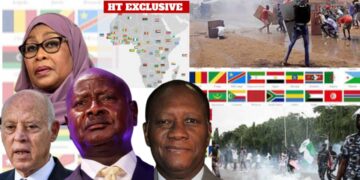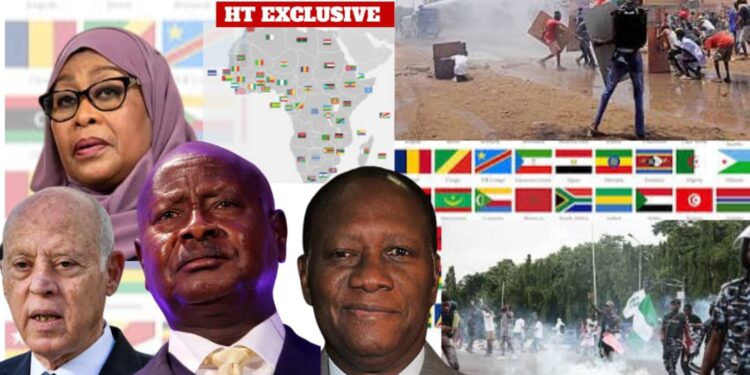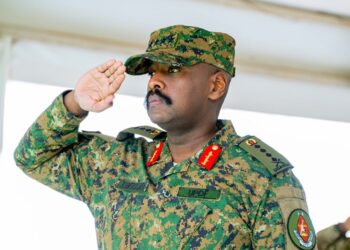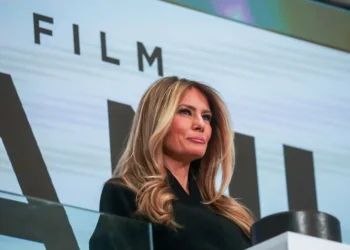By Enyichukwu Enemanna
The age-long definition of democracy as expounded by Abraham Lincoln has consistently faded in theoretical meaning and practice, moving from government of the people for the people to government of a few powerful individuals (who have access to power) for their cronies and allies.
The intolerance of the plurality of opinions and dissenting views in the African political space has largely whittled down the very essence of democracy, widely believed to represent the most acceptable form of governance of all times. While a significant number among the governed population ought to fully own the governance process, as democracy entails, developments in many African countries in recent times point otherwise.
From de-registration of lawfully licensed parties to disqualification of rival candidates and prosecution of opposition figures on trumped-up charges, the political atmosphere in several African countries has been unfairly tilted to favour the party in power, as against equal civic space for everyone to market their agenda before the electorate.
The desperation to exclude opposition from vying for political power stems from the ambition of ruling parties to seek a backdoor to remain in office, in some cases to avoid the resentment of the masses, mostly expressed in the ballots. This has given rise to the sit-tight syndrome where leaders deploy unconventional means to hold on to power, including compromise of the electoral system and changing the constitution to grant them extended tenure.
In Cameroon, President Paul Biya, who became President in 1982, has been accused of presiding over a ruthless crackdown on dissent in over 40 years of his iron-fist reign. Discussing succession even among his aides is seen as a taboo as he clings on, raising suspicion about his intention to hand over power. In Equatorial Guinea, where Teodoro Obiang Nguema Mbasogo has firmly held sway since 1979, his tenure has been characterised by allegations of human rights abuses and corruption, with limited political freedoms for the populace.
Same goes for the Republic of Congo (Congo Brazzaville), where President Denis Sassou Nguesso, who first ruled from 1979 to 1992, returned to power in 1997 following a civil war. He has since remained in office. In 2015, he caused a constitutional referendum removing presidential term limits to enable him to seek re-election. During the 2016 election, he secured another term amidst opposition allegations of electoral fraud.
In Rwanda, Paul Kagame, who became President of the East African country in 2000, amended the constitution in 2015 to extend his tenure beyond 2017. He was cleared to contest for another fresh term of seven years, which ended in 2024, after which he can only be eligible to run twice, each for a five-year term. This makes him eligible to remain in office until 2034. He raked in over 98% of the votes in July 2024 to seal his third term.
It’s Antithetical to Building Strong Institutions — Analyst
A political commentator and lecturer at Baze University Abuja, Dr. Joe Izuagbe, while lending his voice to what he called “criminal adulteration of democracy,” said stifling opposition voices weakens institutions of government, while individuals in power become more emboldened and authoritative. According to him, strong individuals in the midst of weak institutions lead to corruption, absence of checks and balances, and unhealthy civil space.
“When there are frequent clampdowns, censorship is unavoidable; arbitrary arrests, harassment, and violence are unavoidable. And you know this clearly violates basic rights such as freedom of expression, assembly, and association. Groups or individuals cannot freely meet when they are not certain that the state security forces will not swoop in and detain them indefinitely. In any environment where discussions that are not centred on supporting the government of the day are viewed with suspicion, the people’s choices in choosing who leads them become highly restricted.”
“Governments that suppress opposition will see nothing wrong in undermining judicial independence, arm-twisting the electoral body, and compromising the legislature, which is seen as the bastion of democracy. These institutions, instead of becoming instruments to build a robust democratic environment, become tools of the ruling party to suppress,” he stated.
Dr. Izuagbe further noted that citizens easily lose faith in democratic systems where opposition leaders are persecuted or elections are brazenly rigged to achieve a pre-determined aim. This, he remarked, can lead to voter apathy, civil unrest, or even support for undemocratic alternatives.
For him, without an active opposition to critique and offer alternatives to government policies, poor governance, corruption, and executive recklessness will go unchecked, a situation that can hinder economic and social progress. This, he said, is in addition to sanctions, reduced foreign aid, strained diplomatic relations, and the impact on the global standing and development of countries that consistently crack down on dissent.
Uganda
The East African country, like some of its neighbours, has become a danger and volatile zone for opposition politicians, journalists, and activists. In the last 39 years, while the United States, for instance, has produced at least six Presidents, including Ronald Reagan, George W. Bush, Bill Clinton, Barack Obama, Donald Trump, and Joe Biden, Uganda has only known one President — Yoweri Museveni, who has continued to recycle himself since 1986 as the nation’s leader.
After spearheading a guerrilla warfare that ousted the previous regime, Museveni has continued to extend his tenure beyond the initially stipulated period. In 2005 and 2017, he orchestrated constitutional amendments expunging presidential term and age limits, respectively, paving the way for him to become a life President if he wishes. He has also been criticised for presiding over democratic backsliding, suppression of political opposition, and large-scale human rights violations.
He has repeatedly arrested opposition leaders, including Kizza Besigye and Bobi Wine, whose real name is Robert Kyagulanyi, often without clear charges or under vague accusations that they are inciting violence. In 2019, Bobi Wine, a singer-turned-politician, was charged with “annoying” the country’s leader in a move some analysts say is part of a “worrying” increase in political repression. He appeared in court on a charge of treason for an incident in August 2018, in which he and other opposition figures allegedly threw stones at Museveni’s presidential convoy while he was campaigning during a by-election.
An Afrobeat icon who has long used his music to make a case for political change in Uganda, the introduction of Wine’s 2016 hit “Situka”, which means “Rise up” in the Luganda language, goes — “When leaders become misleaders, and mentors become tormentors, when freedom of expression becomes a target of suppression, opposition becomes our position,” made him popular among young Ugandans, many of whom have known only one President since birth.
His campaign in 2020 against Museveni was brutally suppressed by security forces, with his rallies and gatherings often dispersed with teargas and supporters arrested. Even when less active in politics in 2025, the country’s army head, General Muhoozi Kainerugaba, who is the son of President Yoweri Museveni, threatened to “behead” Bobi Wine.
In the case of Kizza Besigye, leader of the Forum for Democratic Change (FDC) party, a former personal physician who stood against Museveni in the 2001, 2006, 2011, and 2016 elections, he has been incarcerated on treason charges arising from allegations of illegal possession of weapons and treachery. Despite a Supreme Court ruling that civilians are not to be tried in military courts, Museveni has gone ahead to introduce a new law that could allow his government to take Besigye back to a military court martial as soon as it is passed by the legislature, an institution believed to be compromised under his prolonged presidency.
Tanzania
President Samia Suluhu Hassan, who succeeded John Magufuli following his death in office, had been lauded for lifting repressive bans on political activities involving the opposition and media censorship put in place by her predecessor. The praise was, however, short-lived, as she quickly launched a crackdown that later saw unexplained abductions, detention, and in some cases killings, of political opponents.
In September 2024, a senior member of the opposition CHADEMA party, Ally Kibao, was arrested and later found dead, with marks of violence all over his body. While President Hassan condemned his killing, opposition figures accused security forces of involvement, insisting on an independent investigation. A protest to draw attention to the clampdown on the opposition at the instance of CHADEMA party chairman, Freeman Mbowe, was met with stiff resistance by the police, leading to Mbowe’s arrest along with other opposition leaders.
Ahead of the country’s election in October, a top contender and leader of the CHADEMA party, Tundu Lissu, has been repeatedly arrested and charged with treason. This was in connection with what prosecutors said was a speech calling on the public to launch a rebellion and disrupt the upcoming election. Lissu has, however, denied the allegation, instead calling for reforms that will strengthen the independence of the electoral commission.
In a move which activists have described as a ploy to suppress political competition, the Independent National Election Commission this month announced the disqualification of the CHADEMA party in the upcoming election, accusing it of refusal to sign the mandatory code of conduct. The ban will remain in effect in every by-election till 2030. The detained Lissu is still undergoing prosecution over alleged treason and incitement.
Ivory Coast
The government has come under severe criticism for using security forces and the judiciary to stifle opposing voices and limit political competition. At least four opposition candidates have been disqualified from running in the October election, in which the governing party of 83-year-old President Alassane Ouattara, the RHDP, is yet to announce its candidate. Laurent Gbagbo, the country’s President from 2000 until his arrest in 2011, his former right-hand man, Charles Blé Goudé, and exiled former Prime Minister and rebel leader, Guillaume Soro, have all been barred through court rulings.
The latest to join the list of disqualified candidates is a former Chief Executive Officer of Credit Suisse, Tidjane Thiam, who, according to an Abidjan court, is not eligible to run for the election. The court held that Thiam forfeited his Ivory Coast nationality when he acquired French citizenship in 1987, making him ineligible to run for the top job. Despite renouncing his French citizenship in February to qualify to run, he was unsuccessful. Thiam said the court’s decision was an “act of democratic vandalism, which will disenfranchise millions of voters”. His disqualification came just a week after he was confirmed as the presidential candidate of the centre-right Democratic Party — the PDCI.
Tunisia
In Tunisia, President Kais Saied has presided over a rapid reversal of the highly celebrated Arab Spring, in which democratic forces were dislodged through a series of anti-government protests in late 2010. In addition to placing a ban on political rallies and the incessant arrest of opposition figures he usually brands as “corrupt elite” and “enemies” of the state, Saied has been accused of taking control of the judiciary.
In 2022, he dissolved the Supreme Judicial Council and gave himself power over judicial appointments. He has outrightly removed judges he views as sympathetic to the opposition. Since his 2021 power grab, in which he suspended parliament and ruled by decree, Saied has governed in the total absence of checks and balances, which undermines democratic principles.
His decrees have weakened institutions that could resist him, making it easier to target opponents. He has also been criticised for militarising politics. Civilians, including political critics, have been increasingly tried in military courts, which human rights groups say violates their rights to a fair hearing.



































